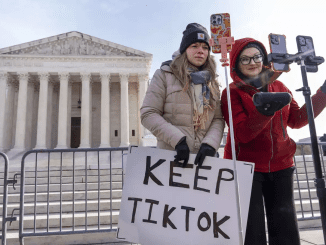Lia Thomas, the trailblazing transgender swimmer, has announced her retirement from professional women’s swimming after being excluded from the Olympic team. In a deeply emotional message, Thomas revealed her decision, saying, “No one wants me on their team.” This marks a significant moment in her career, as her journey has been one of both groundbreaking achievements and painful struggles.

Thomas made history as the first openly transgender woman to compete in NCAA Division I swimming, where she became a highly recognized figure. Her participation, however, has sparked ongoing debates about transgender athletes in women’s sports. Despite her accomplishments in the pool, Thomas faced increasing scrutiny, and her exclusion from the Olympics was a major blow.
Reflecting on her decision, Thomas shared, “I’ve worked tirelessly to reach this point, but it seems my presence is not welcomed.” Her voice quivered as she expressed the heartbreak of realizing that, despite her hard work and dedication, she felt unwelcome in the sport she has always loved. “It’s disheartening to realize that despite my efforts, I am still not accepted,” she added.

Thomas’s retirement is a personal and difficult decision, as swimming has been at the core of her life since childhood. However, she made it clear that she could not continue in a competitive environment where she felt marginalized and unsupported. “Swimming has been my life, but I cannot continue in an environment where I feel unwanted,” she stated.
Her retirement has ignited a renewed conversation on inclusivity and fairness in sports. Advocates for transgender rights emphasize the need for greater acceptance, arguing that athletes should be allowed to compete in categories aligned with their gender identity. On the other hand, critics continue to raise concerns about maintaining fairness and equality in women’s sports, highlighting the complexity of these issues.
In her message, Thomas expressed hope that her experience would bring attention to the challenges transgender athletes face. “I hope that my story sheds light on the difficulties faced by transgender athletes,” she said. “We deserve the same respect and opportunities as any other competitor.”

As the sports world processes Thomas’s retirement, it highlights the ongoing need for thoughtful policies that balance inclusivity with fairness. The discussion will undoubtedly continue, with the hope that future athletes will be able to pursue their passion without having to choose between their identity and their dreams.
In closing, Thomas thanked her supporters and left a message of hope. “Thank you to everyone who stood by me,” she said. “This is not the end, but a new beginning. I will continue to advocate for change, so that no one else has to feel the way I do now.”


